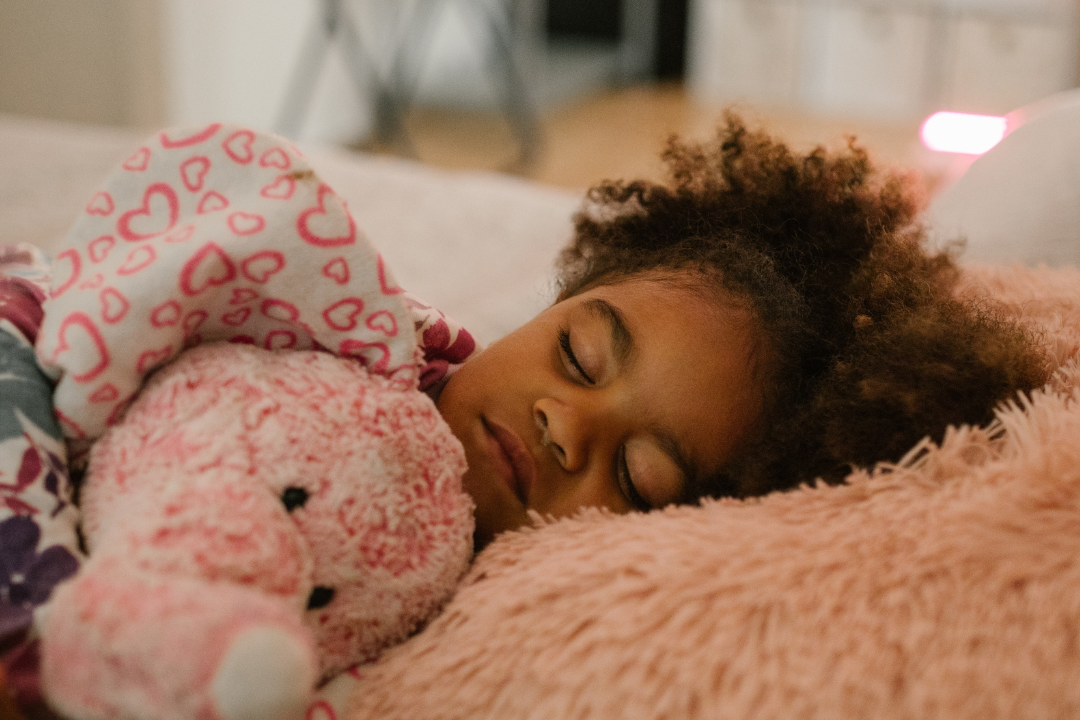Introduction
For many parents, bedtime can be a challenging part of the day. Some children struggle to sleep alone, needing a parent’s presence to fall asleep. Others have difficulty settling, waking frequently, or resisting bedtime altogether. While these concerns are common, research suggests that independent sleeping and self-regulation skills play a crucial role in a child’s emotional development, cognitive growth, school readiness, and overall school success.
Children who learn to sleep independently develop stronger emotional resilience, problem-solving skills, and self-regulation—key components for success in a structured school environment. This article explores the science behind sleep, self-regulation, and academic readiness while offering practical strategies for parents to foster these essential skills.
The Science of Sleep and Learning
Quality sleep is essential for brain development, especially in the early years when children are rapidly absorbing new information. During sleep, the brain consolidates learning, strengthens memory, and regulates emotions. Studies show that children who get adequate, uninterrupted sleep perform better in cognitive tasks, demonstrate improved attention spans, and are more emotionally stable in social settings.
Conversely, sleep deprivation in young children has been linked to difficulties with impulse control, poor emotional regulation, and increased hyperactivity—all of which can negatively impact their ability to thrive in a school environment. Sleep is not just about physical rest; it is an active process that supports emotional and intellectual growth.
The Neurological Basis of Sleep Dependence: Understanding the RAS
To understand why some children struggle with independent sleep, it helps to look at the brain’s Reticular Activating System (RAS). The RAS is a network of neurons in the brainstem responsible for regulating wakefulness, alertness, and the transition between sleep and wake states. It acts like a filter, helping the brain determine what stimuli to pay attention to and what to ignore. One might think of it as a biological safety scanner.
When children rely on a parent’s presence to fall asleep, their RAS becomes conditioned to associate sleep initiation with external reassurance. This means that when the parent is absent, the RAS remains more active, making it difficult for the child to transition into sleep independently. It also accounts for frequent wakings during the night as this activation recurs at the end of each sleep cycle if the absence of the parent is registered. Over time, this reliance can reinforce sleep anxiety and difficulty self-soothing. However, just as the brain can learn to depend on external sleep cues, it can also be trained to self-regulate through consistent routines and gradual independence-building strategies.
Independent Sleeping: A Foundation for Emotional Growth
Sleeping independently is more than just a bedtime habit—it is a developmental milestone that nurtures confidence and self-sufficiency. When children learn to fall asleep without external aids, such as a parent lying beside them or rocking them to sleep, they build self-soothing skills that translate into greater independence in other aspects of life.
Children who sleep independently tend to exhibit:
• Greater emotional resilience when facing challenges.
• Improved self-confidence in social and academic settings.
• Reduced anxiety and dependency on parental reassurance.
These benefits extend beyond bedtime. The ability to self-soothe at night teaches children how to manage stress and frustration during the day, an essential skill for school readiness. One of the greatest skills a parent can teach a child is the ability to handle everyday challenges at school, both academically and socially, completely on their own. This is very empowering for children and eventually also impacts on the self-confidence and motivation to master new skills.
Self-Regulation and School Success
Self-regulation refers to a child’s ability to manage their emotions, behaviour, and impulses. It is a skill that allows children to wait their turn, follow instructions, and persist with challenging tasks in a classroom setting. Research suggests a strong link between self-regulation and academic success— children who can control their emotions and actions tend to perform better academically, maintain positive peer relationships, and adapt more easily to structured learning environments.
There is a direct connection between independent sleeping and self-regulation. When children learn to soothe themselves to sleep, they practice delayed gratification and emotional control, which are critical for school success. A child who can settle independently at bedtime is more likely to handle transitions, disappointment, confrontation, and frustration more effectively during the school day.
Retraining the RAS and Developing Good Sleep Hygiene
Since the Reticular Activating System plays a key role in sleep dependence, retraining it involves teaching the brain to associate sleep with internal rather than external cues. Here are strategies to help:
1. Develop a Strong Sleep Association Routine
• Establish a consistent bedtime and wake-up time, even on weekends.
• Use a predictable pre-sleep sequence (e.g., bath, book, and bed) to signal to the RAS that sleep is approaching.
• Create a calming sleep environment with dim lighting, minimal noise, and comfortable bedding.
2. Minimize Sleep Disruptors
• Reduce screen exposure at least an hour before bedtime, as blue light can interfere with melatonin production, a hormone essential of restful sleep.
• Avoid stimulating activities before bed, opting instead for quiet reading or gentle stretching.
• Limit sugar and caffeine intake in the evening.
3. Encourage Internal Sleep Cues
• Ideally a dim red/yellow night light should be sufficient and is conducive to good rest. The use of soft music or white noise instead of parental presence as a sleep aid just replaces one safety que with another, and the child will most likely then become dependent on that stimulus to fall asleep eventually, which is not ideal. A parent can consider using white noise or a fan in situations when there may be a temporary unusual noise that may be disturbing the child such as visiting guests, heavy winds, unusual neighbourhood activity, and the likes.
• Gradually reduce verbal reassurance at bedtime, replacing it with self-soothing techniques like deep breathing, counting sheep, or lying with closed eyes and listening to sounds in their surroundings. Teaching children to play mindfulness “games” such as listening out for the furthest sound they can hear and then the closest one etc. can also be utilised to help them regulate in times of anxiety or upset as well as sleep.
• Teach relaxation methods such as progressive muscle relaxation or guided imagery to help children transition into sleep independently. If a parent does not feel confident in guiding imagery, remember that this is no different than telling a soothing and relaxing story where the child can imagine they are in a calm and safe environment seeing or experiencing something the love and feel relaxed with.
4. Build Confidence in Independent Sleeping
• Reinforce small successes with praise (e.g., “You fell asleep on your own tonight—that’s amazing!”). Never express frustration or disappointment when a child tries and fails to fall asleep on their own, this is a skill that they need to be guided in with patience and consistency.
• If the child wakes at night, offer brief reassurance but avoid prolonged engagement or “negotiations”. If there is a physical need such as bathroom or water, address the need and return the child to bed.
• Encourage positive self-talk (e.g., “I am safe, and I can fall asleep by myself.”). Retraining the RAS takes consistency, but over time, children learn to trust their ability to fall asleep independently. Consistency is key!!! Keep at it, once a child is confident in falling asleep on their own, bedtime routine becomes a lot easier for the whole family.
Addressing Parental Concerns and Cultural Differences
Some parents worry that encouraging independent sleeping may harm their child’s emotional security. It is important to recognize that sleep habits vary across cultures. In some traditions, co- sleeping is the norm, and children gradually transition to independent sleeping at a later stage.
The key is to strike a balance between fostering security and promoting independence. If a child is showing signs of sleep-related anxiety, parents can offer gradual support while still working towardsthe goal of independent sleep. If persistent sleep difficulties arise, consulting a paediatric sleep specialist or child psychologist can provide tailored strategies. The number one rule is that there should NEVER be any tears involved in falling asleep. A child that is left to cry themselves to sleep does not learn to self-sooth, they learn to let go of their sense of safety in their caregiver, which leads to attachment and security challenges.
Even throughout “sleep training,” a parent should remain responsive to a child’s emotions and never allow them to feel that their needs are not heard. If parents remain responsive and the bedtime routine is free of tears and upset, no harm will be done to emotional security or the relationship between the parent and the child. While every child’s journey is unique, fostering these skills early on lays the foundation for a confident, well-adjusted learner—one who is ready to embrace the challenges and joys of school life. For parents who need guidance in fostering independent sleep and self-regulation in their children, tailored strategies and professional support can make all the difference.
The Author: Linda-May Roodt (Specialist Wellness Counsellor)

More about Linda-May Roodt: https://www.vitanova.co.za/meet-the-team/linda-may-roodt-specialist-wellness-counsellor/
To schedule a session with the author or any of our counsellors at Vita Nova, please contact us on 0712979992, or go to www.vitanova.co.za. We offer a range of counselling services and have interns that can provide you with assistance for free if you are not in a position to afford therapy.
For 24 hr assistance on mental health matters contact SADAG on 0800 567 567
Help is always available.


